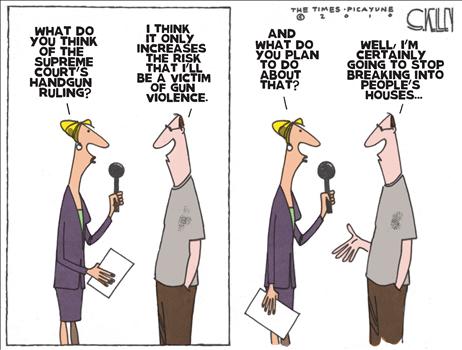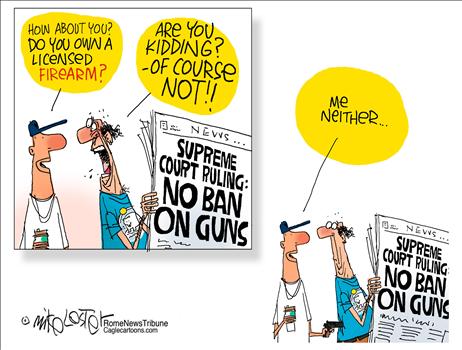This seems to be Supreme Court week. First, we have the confirmation hearings for Elena Kagan, then two decisions are handed down by the Court that have significant ramifications, one for good, the other just the opposite.
The good: the Second Amendment has survived the scrutiny of the Court—how nice of them to decide it’s really there. By a slim 5-4 decision, the Court declared that the right to keep and bear arms applies to states and cities, too, thereby overturning a Chicago ordinance that tried to prohibit the right of self-defense by carrying a firearm.
Now, I’m no gun nut. I’ve never owned a gun, and I’ve only shot guns one time—at an NRA range. I have to say I enjoyed it, and was a much better shot than I expected I would be. All that to say, I’ve never had much experience along that line, but that doesn’t matter. It’s a fundamental right guaranteed by the Constitution and should not be abridged. There are definitely benefits that come from gun ownership:
As some commentators have noted, though, there is a downside to this: the fact that the vote was only 5-4 shows how far we have strayed from written guarantees in the Constitution. Think about it—four justices on the Supreme Court were willing to say this right does not exist nationwide.
There was one bit of hypocrisy on display in this decision as well. Sonia Sotomayor voted with the minority after telling senators in her confirmation hearings that the right to bear arms was “settled law.” Apparently, she wanted to unsettle it. Again, this shows how much credence we can give to what nominees to the Court say during their hearings. The same applies to the Kagan hearings going on currently.
That decision was positive, but the other decision was disturbing. A Christian group at a California university was denied funds as a student group because it had as its requirements that individuals wanting to be part of the organization had to adhere to basic Biblical tenets, which included standing firm on the Biblical belief that homosexuality is not acceptable. Discriminatory, the university said. And the Supreme Court agreed. Once more, this was a 5-4 decision. Its impact will ripple throughout the nation as Christian groups will be under fire for being . . . well, Christian.
The decision shows how acceptance of homosexuality has infiltrated our society. Even more, it shows that there is a noose around the neck of the First Amendment’s right of free exercise of religion. Christians are now open to penalties for practicing their faith.
As I’ve said before, the worst part of all this is the undeniable fact that, to some extent, we now live under an oligarchy. Five people can determine the direction of our society. The judiciary has become a little god. This does not bode well for the future.


